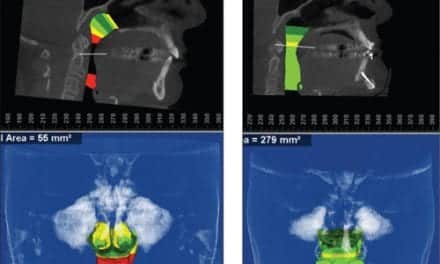by David Douglas
Giving sedatives during continuous positive airway pressure (CPAP) titration will improve patients’ subsequent compliance, researchers report in the November issue of Chest.
"Obstructive sleep apnea is becoming increasingly prevalent," lead investigator Dr. Christopher J. Lettieri told Reuters Health. "CPAP remains the treatment of choice for most patients. Unfortunately many people are intolerant of CPAP initially because they find it uncomfortable or because they have a difficult time falling asleep with it on."
"Once they become accustomed to CPAP," he added, "their adherence is typically very good. However, many people discontinue the use of CPAP early on and never get to this point."
Dr. Lettieri and his colleagues at Walter Reed Army Medical Center, Washington DC randomized 117 patients to receive a 2-week course of 3 mg of eszopiclone or placebo during CPAP titration. Ninety-eight patients completed the study.
Eszopiclone produced significant improvements in mean sleep efficiency, total sleep time and the number of residual obstructive events seen at the final CPAP titration, compared to placebo.
Over the first 4 to 6 weeks, the active-treatment group showed significantly better compliance. They used CPAP on a higher percentage of nights (75.9% versus 60.1%) and for more hours per night (4.8 versus 3.9 hours).
Intent-to-treat analysis, which assumed that subjects who did not return for follow-up did not use CPAP at all, still showed a tendency toward greater compliance in the premedication group.
"Not only did they use it more, but less of them discontinued CPAP," Dr. Lettieri said.
"Given the prevalence of sleep apnea and the common difficulties patients have with CPAP, this and other interventions aimed at improving the initial experience with CPAP may help improve adherence," he concluded.
Chest 2009;136:1263-1268.
Related Articles
Surgery May Improve CPAP Compliance in Sleep Apnea Patients
HealtheTrax Software Aims to Boost CPAP Compliance Through Remote Monitoring



